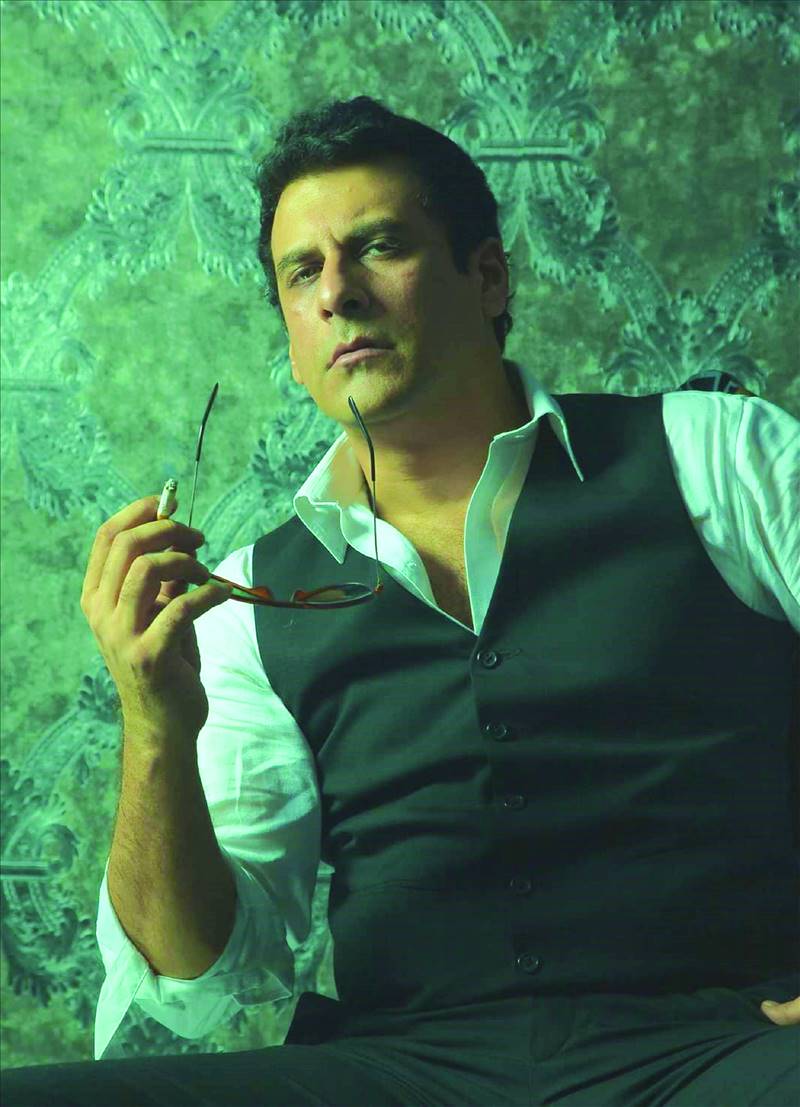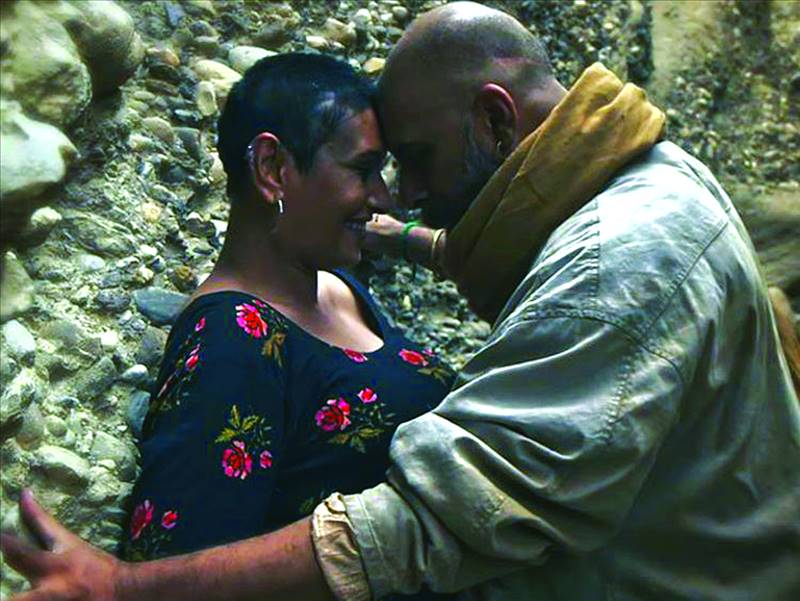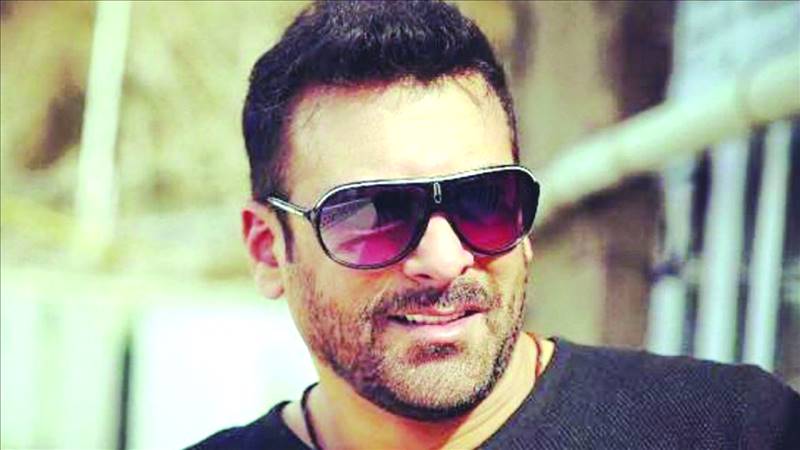
Usually known for his villainous roles on both the big and small screen, including drama serials Oas and Dil Hai Chota Sa and films Waar and O21, Shamoon Abbasi has also worked prolifically as a director, producer and writer behind the camera.
The Friday Times caught up with the artist to ask him a few questions
Muhammad Ali: When and how did you enter the Pakistani showbiz industry?
Shamoon Abbasi: I entered show business in 1997, my first play being Titli. It was one of the telefilms from the Tapal Cinema series produced and directed by Yasir Akhtar. Later on, I played a comedy role in a PTV serial called Kashish which garnered a lot of appreciation and established me as an actor. Within a year, my interest developed in the nuances of the art of direction and I started receiving training from learned people in the field. I assisted Yasir with his work, participated in some workshops and around 1999, I was a complete director – in fact, the only thriller director in Pakistan, my first project in the genre being Karoro’n Ka Admi.
M.A.: We mostly know you for your villainous roles. Tell us about a character of yours which was different and which you hold very dear to your heart.
S.A.: While there are many characters that I have enjoyed doing, one that I would like to mention is from a telefilm of mine called Ward No. 7, a project that also made it to Kara Film Festival. Another telefilm that is very close to my heart was done for GEO TV, called Gurd, a highly interesting project based on narcotics in Karachi.

M.A.: We know you as an actor and as a director, but you have written work to your credit as well. Which are some of the projects that you have written?
S.A.: More than ninety percent of the projects that I have done were written by me.
M.A.: Tell us something about your creative agency, “Shamworx”. What was the motivation behind encouraging all young creative artists to come to the front?
S.A.: It’s an initiative that began not more than two months ago. I wanted to introduce the system of collaborating with each other. Most of the times, when you are approached by the industry, the prevailing purpose is monetary benefit. In this pursuit of money, what happens is that young people with real skills are ignored. They need to be collaborated with and allowed to exhibit the great content they are capable of producing, so that not only is good stuff created, but the creative enthusiasts actually spend a good time together. I wanted to make people realize that they are wasting their time sitting at home. I wanted them to shrug off the gloom of the Covid-19 lockdown and start working in their respective capacities. Once those collaborations materialize, they will be taken to a larger platform.
M.A.: You have been one of the most active participants when it comes to the revival of our film industry, acting in Waar, O21, Parwaz Hai Junoon and directing some yourself. What keeps you hopeful?
S.A.: I personally am a film lover, and I want cinema to stay alive in Pakistan!
M.A.: Who has been your inspiration when it comes to multitasking?
S.A.: Mel Gibson, with his talents of acting, writing and direction is one of my inspirations. There are a lot of other such people who teach you that you can do multi-tasking with a little bit of concentration on each activity.
M.A.: Your film Durj is based on cannibalism. How much and what kind of research went into the making of it?
S.A.: Durj took two years of research. The most fragile part of writing that film was that I had to hide a lot of the controversial aspects of the matter on which my story-line was based. Also, with such a gruesome story under development, you need to take care that you aren’t turning it into a boring piece of work. You have to keep it like a film and not a documentary, even if you are tackling a taboo. I wrote eight drafts before finally taking it to the sets. I also had to be very precise and specific about what I had to deliver about the topic to the Pakistani audience, because the activity on which it was based is a global one. But, seeing that I am penning it down for a specific audience, I had to keep track of what is to be shown and what is not to be shown.


M.A.: What was your initial response when it got banned? Where can we watch it now?
S.A.: Well, that ban was a little awkward as all the other censor boards had approved it without any censoring. So, when the final board banned it, it came to me as a bit surprising. The film, however, is available to watch on Vidly TV.
M.A.: Being a director yourself, under whose direction from our drama industry did you enjoy working the most?
S.A.: When it comes to drama directors, I am not really a fan of many – for most of them are driven by the demands of channel owners. It is not, of course, their fault, but their creativity does get suppressed as a result. When it comes to film, I loved working with Bilal Lashari. He has a vast mind, open to innovative ideas. He gives you all the space and time you need in order to work on your character.

M.A.: You are known for having introduced the genre of web-series in Pakistan. Tell us something about that.
S.A.: Yes, I have always been introducing stuff, and even creative artists such as Neelum Munir, Muhib Mirza and Adnan Shah Tipu. I was also the first one to launch mystery and action series in Pakistan around 2001 in order to make production houses understand that people want stories other than ones revolving around mothers and daughters-in-law. Similarly, when the genre of web-series gained popularity, I went for that as well, and also did it free of cost for the entertainment of our audience. I also wanted to send across the message that you do not always have to spend hefty amounts of money on good productions. At times, it is only the content quality that matters. Two of my web based short films, Mein Rahoon Gi and Zinda got nominated and won awards, the latter garnering unimaginable appreciation.
M.A.: What are you working on these days? Tell us about your upcoming projects.
S.A.: Till 2019, I had completed five feature films of mine and I was waiting for them to be released in 2020. Unfortunately, that didn’t happen, owing to the pandemic. Currently, I am doing a short web-series titled Akela. It comprises seven episodes, each being ten minutes long, so that people do not get bored. Apart from that, I will start working on my favourite project around September, which happens to be Javed Iqbal and the Hundred Smiles. It’s the true story of a killer who murdered 100 children in Lahore and then offered himself before the police. I am desperately waiting for this project to commence, and so are many other people. By the end of this year, I will also be doing Jamil Dehlavi’s film, Machera. I feel honoured to be a part of such a brilliant director’s project. These are all the projects which are in pipeline and will be out by the time 2020 comes to an end.
Muhammad Ali is an M.Phil scholar and a former visiting lecturer at GCU, Lahore. His interest lies in indigenous literature, the specific research areas being Partition novel, Environmental Literature emerging from South Asia and classical and contemporary Pakistani television drama. His research on Sahira Kazmi’s “Zaib un Nisa” which was a part of his graduation thesis has been presented on various platforms including Olomopolo Media. This interview is a part of a series of interviews in which various Pakistani celebrities including writers, actors and directors will be asked questions regarding their professional work. The writer can be reached at m.ali_aquarius85@yahoo.com
The Friday Times caught up with the artist to ask him a few questions
Muhammad Ali: When and how did you enter the Pakistani showbiz industry?
Shamoon Abbasi: I entered show business in 1997, my first play being Titli. It was one of the telefilms from the Tapal Cinema series produced and directed by Yasir Akhtar. Later on, I played a comedy role in a PTV serial called Kashish which garnered a lot of appreciation and established me as an actor. Within a year, my interest developed in the nuances of the art of direction and I started receiving training from learned people in the field. I assisted Yasir with his work, participated in some workshops and around 1999, I was a complete director – in fact, the only thriller director in Pakistan, my first project in the genre being Karoro’n Ka Admi.
M.A.: We mostly know you for your villainous roles. Tell us about a character of yours which was different and which you hold very dear to your heart.
S.A.: While there are many characters that I have enjoyed doing, one that I would like to mention is from a telefilm of mine called Ward No. 7, a project that also made it to Kara Film Festival. Another telefilm that is very close to my heart was done for GEO TV, called Gurd, a highly interesting project based on narcotics in Karachi.

M.A.: We know you as an actor and as a director, but you have written work to your credit as well. Which are some of the projects that you have written?
S.A.: More than ninety percent of the projects that I have done were written by me.
M.A.: Tell us something about your creative agency, “Shamworx”. What was the motivation behind encouraging all young creative artists to come to the front?
S.A.: It’s an initiative that began not more than two months ago. I wanted to introduce the system of collaborating with each other. Most of the times, when you are approached by the industry, the prevailing purpose is monetary benefit. In this pursuit of money, what happens is that young people with real skills are ignored. They need to be collaborated with and allowed to exhibit the great content they are capable of producing, so that not only is good stuff created, but the creative enthusiasts actually spend a good time together. I wanted to make people realize that they are wasting their time sitting at home. I wanted them to shrug off the gloom of the Covid-19 lockdown and start working in their respective capacities. Once those collaborations materialize, they will be taken to a larger platform.
“When it comes to drama directors, I am not really a fan of many – for most of them are driven by the demands of channel owners. It is not, of course, their fault, but their creativity does get suppressed as a result”
M.A.: You have been one of the most active participants when it comes to the revival of our film industry, acting in Waar, O21, Parwaz Hai Junoon and directing some yourself. What keeps you hopeful?
S.A.: I personally am a film lover, and I want cinema to stay alive in Pakistan!
M.A.: Who has been your inspiration when it comes to multitasking?
S.A.: Mel Gibson, with his talents of acting, writing and direction is one of my inspirations. There are a lot of other such people who teach you that you can do multi-tasking with a little bit of concentration on each activity.
M.A.: Your film Durj is based on cannibalism. How much and what kind of research went into the making of it?
S.A.: Durj took two years of research. The most fragile part of writing that film was that I had to hide a lot of the controversial aspects of the matter on which my story-line was based. Also, with such a gruesome story under development, you need to take care that you aren’t turning it into a boring piece of work. You have to keep it like a film and not a documentary, even if you are tackling a taboo. I wrote eight drafts before finally taking it to the sets. I also had to be very precise and specific about what I had to deliver about the topic to the Pakistani audience, because the activity on which it was based is a global one. But, seeing that I am penning it down for a specific audience, I had to keep track of what is to be shown and what is not to be shown.


M.A.: What was your initial response when it got banned? Where can we watch it now?
S.A.: Well, that ban was a little awkward as all the other censor boards had approved it without any censoring. So, when the final board banned it, it came to me as a bit surprising. The film, however, is available to watch on Vidly TV.
M.A.: Being a director yourself, under whose direction from our drama industry did you enjoy working the most?
S.A.: When it comes to drama directors, I am not really a fan of many – for most of them are driven by the demands of channel owners. It is not, of course, their fault, but their creativity does get suppressed as a result. When it comes to film, I loved working with Bilal Lashari. He has a vast mind, open to innovative ideas. He gives you all the space and time you need in order to work on your character.

“You have to keep it like a film and not a documentary, even if you are tackling a taboo”
M.A.: You are known for having introduced the genre of web-series in Pakistan. Tell us something about that.
S.A.: Yes, I have always been introducing stuff, and even creative artists such as Neelum Munir, Muhib Mirza and Adnan Shah Tipu. I was also the first one to launch mystery and action series in Pakistan around 2001 in order to make production houses understand that people want stories other than ones revolving around mothers and daughters-in-law. Similarly, when the genre of web-series gained popularity, I went for that as well, and also did it free of cost for the entertainment of our audience. I also wanted to send across the message that you do not always have to spend hefty amounts of money on good productions. At times, it is only the content quality that matters. Two of my web based short films, Mein Rahoon Gi and Zinda got nominated and won awards, the latter garnering unimaginable appreciation.
M.A.: What are you working on these days? Tell us about your upcoming projects.
S.A.: Till 2019, I had completed five feature films of mine and I was waiting for them to be released in 2020. Unfortunately, that didn’t happen, owing to the pandemic. Currently, I am doing a short web-series titled Akela. It comprises seven episodes, each being ten minutes long, so that people do not get bored. Apart from that, I will start working on my favourite project around September, which happens to be Javed Iqbal and the Hundred Smiles. It’s the true story of a killer who murdered 100 children in Lahore and then offered himself before the police. I am desperately waiting for this project to commence, and so are many other people. By the end of this year, I will also be doing Jamil Dehlavi’s film, Machera. I feel honoured to be a part of such a brilliant director’s project. These are all the projects which are in pipeline and will be out by the time 2020 comes to an end.
Muhammad Ali is an M.Phil scholar and a former visiting lecturer at GCU, Lahore. His interest lies in indigenous literature, the specific research areas being Partition novel, Environmental Literature emerging from South Asia and classical and contemporary Pakistani television drama. His research on Sahira Kazmi’s “Zaib un Nisa” which was a part of his graduation thesis has been presented on various platforms including Olomopolo Media. This interview is a part of a series of interviews in which various Pakistani celebrities including writers, actors and directors will be asked questions regarding their professional work. The writer can be reached at m.ali_aquarius85@yahoo.com

